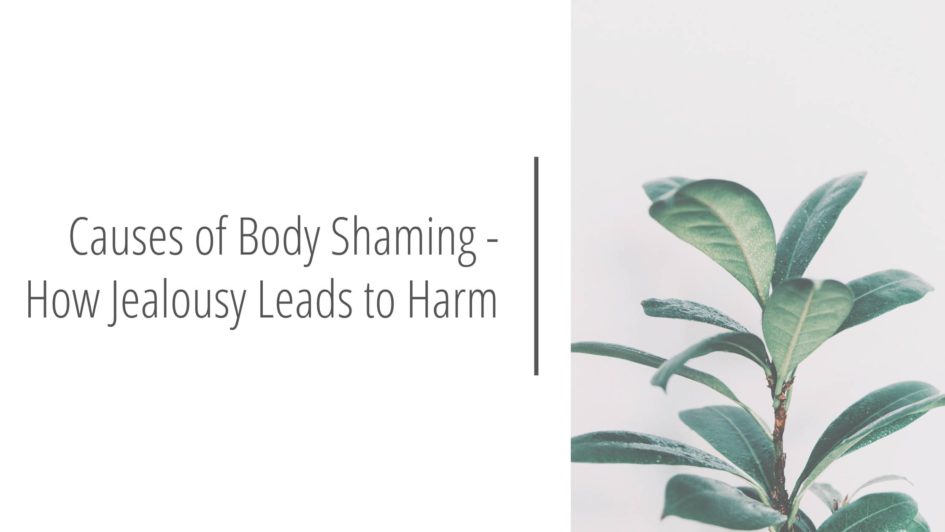Table of Contents
What is Body Shaming?
Before diving into the causes of body shaming, it’s important to first understand what exactly body shaming is.
According to the Oxford English Dictionary (OED), body shaming can be defined as “the action or practice of humiliating someone by making mocking or critical comments about their body shape or size; expressing mockery or criticism about a person’s body shape or size.”
Unfortunately, body shaming is common. It doesn’t have an age or size limit. Anyone in any body can experience body shaming.
Causes of Body Shaming
If we’re honest with ourselves, we know the cause of body shaming.
It’s jealousy. Envy. Chronic comparison.
Body shaming comes from a place of insecurity, especially among women. Women have this innate ability to lift themselves up by tearing others down.
Although this concept happens in pretty much every area of life (work, school, relationships, etc.), it is definitely prominent when it comes to physical appearance.
3 Main Areas Where Body Shaming Rears its Ugly Head
1. Body shaming against large/fat bodies
Research shows that people, especially women, that live with larger bodies experience the most weight stigma. Not only this, but they experience the most shame and even hatred towards the way they look.
Examples
These are just a few examples of what body shaming against large bodies can look like.
- Large-bodied folk are less likely to receive a job position in comparison to someone who lives in a socially accepted body
- Large-bodied folk are told they should never wear clothes “made for” skinny people including bathing suits, shorts, crop tops, and even yoga pants.
- Large-bodied folk are supposed to not wear “skinny people clothes” but stores rarely carry a sufficient supply (if any) of plus-sized clothing
- Large-bodied folk are often told to wear clothes that hide or disguise their weight.
- Large-bodied women are often told that they are too curvy and shouldn’t be allowed to show skin the same way small-bodied women do
- Large-bodied folk aren’t allowed to eat certain foods, drink their calories, spend a day relaxing, or even eat dessert without being labeled as unhealthy or lazy. Small-bodied people don’t experience this same shame
- Large bodied folks are told they are “promoting obesity” by simply choosing to accept their bodies
2. Body shaming against mid-size bodies or “in-between” bodies
The people that fall into this group are often neglected and misunderstood. They don’t meet the requirements for the thin ideal but they also don’t meet the requirements for plus-sized.
Because these people aren’t large enough to be considered “plus-sized,” they tend to not receive empathy or support from large-bodied people. These people fall into the category of “those that don’t quite suffer enough stigma” or “those that don’t endure all the pain that society places on fat people.”
Despite not fitting into the small-bodied or large-bodied crowds, mid-size bodies deserve freedom from body shaming as well.
Examples
These are just a few examples of how mid-size-bodied folk can experience body shaming.
- Mid-size-bodied folk, in order to be accepted by the small-bodied folk, have to lose weight because they aren’t quite small enough to fit with the skinny crowd
- Mid-size-bodied folk, in order to be accepted by the large-bodied folk, have to gain weight and be curvier because they aren’t quite large enough to fit into the plus-sized crowd
- Mid-size-bodied folk can feel rejected because they don’t belong to the group of people with “socially accepted” bodies and they also don’t belong to the group of people that “fight for body equality”
- Mid-size-bodied folk are told they’re so close to being the perfect size, if only they could just lose a little bit of weight
3. Body shaming against small/thin/skinny bodies
Quite a few people don’t think skinny folks deserve to be included in body acceptance discussions. This is because it’s thought that they fit perfectly into the socially accepted mold and don’t ever receive body shaming.
While skinny bodies do typically fit society’s standards, that doesn’t mean they won’t ever receive body shaming comments. Sadly, some of the hurtful comments seem to come from those who claim to “love and support all bodies.”
Even if research shows that fat people receive more criticism and stigma, skinny people still deserve respect. They are deserving of empathy and have the right to love the body they live in.
Examples
These are just a few examples of how thin-bodied folk can experience body shaming.
- Thin-bodied folk receiving comments that they are nothing but skin and bones.
- Thin-bodied folk are quickly labeled as “anorexic” and unhealthy
- Large-bodied people claiming that men don’t want to be with a thin, stick-like woman but with a curvy woman instead
- Large-bodied people shaming skinny people for not having boobs or a big butt
- Thin-bodied folks being told they need to “eat a burger and put some meat on their bones”
- Thin-bodied folk receiving comments on their legs, saying they might “break in half.”
Some Closing Notes
I want to finish this article with three statements:
Regardless of someone’s body size or the causes of body shaming, every body deserves to be free from body shaming.
If you claim to be body positive but shame bodies that don’t look like yours, you aren’t actually body positive. I’m not here for it and I won’t support it.
I don’t know about you, but I’m here to support and love all bodies.
Resources
- To read more on similar topics, check out the body positive section on my website
- To help advocate for and spread awareness of body positivity, check out my anti-diet themed store full of fun bopo products
Thanks for reading!
Rachel Beiler, MHS, RD, LDN


1 Pingback